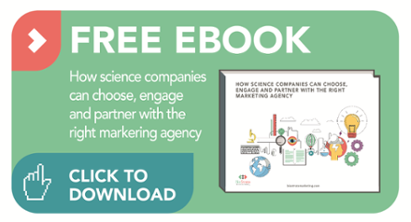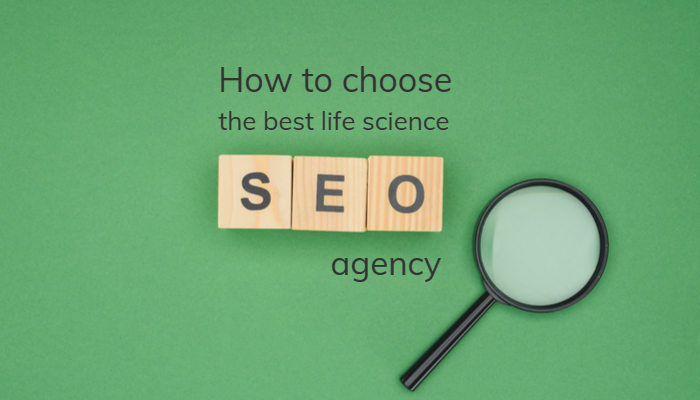The life science sector is made up of a diverse range of areas, from genomics, agrotechnology, biotechnology, cell biology and laboratory automation, through to contract manufacturing, research services, medical devices and diagnostics (to name but a few). As such, it might seem unlikely that you could source a specialist life science agency that will understand your specific niche, have the internal scientific and marketing expertise required, and the appropriate level of global reach.
This begs the question, does the perfect partner for your niche exist? To help you in your search, we’ve put together our top ten tips to set you off on the right path to finding the best marketing agency to match your needs.
1. Conduct an effective online search
Most people start their search for a marketing agency with an online search engine like Google. It may seem obvious, but make sure you use long tail search terms to minimise your time searching online and help you find specialised, niche providers. For example, if you are looking for a specialist life science agency, and ideally one with specific experience in your market sector, e.g. drug discovery, try searching for ‘drug discovery life science marketing agency’. Also, it is worth keeping in mind where each agency appeared on the search engine rankings. For example, if it was easy to find their website (as they were ranked number one on Google), it will be well optimised and they will likely be well-established and strong on digital marketing and search engine optimisation (SEO), which may be something that your own marketing efforts could benefit from.
2. Review the agency’s clients
Look on their website to see who their clients are. This will help you to get a feel for their understanding and knowledge of your market sector. If they have worked across a broad portfolio of life science businesses, they are likely to have gained a strong understanding of the market. Even if the agency may not know your specific application areas intimately, if they have a broad back catalogue of experience to pull on they should be able to quickly grasp your complex scientific technologies, services, products and application areas. It’s also worth noting that, while some companies list current clients, others list every client they have ever worked with (so keep this in mind when reviewing the client lists you find).
3. Make sure the agency’s website is up to date
Take a good close look at the agency’s website. If it is well maintained with a regularly updated life science marketing blog, it is usually a sign that it is a well-managed agency that isn’t over-stretched and understaffed. As a result, they are likely to keep on top of your marketing and do a good job for you. An effective website is also a good indicator that the company knows its stuff (would you want to hire a marketing agency that cannot effectively market itself?).
4. Check out the agency’s content marketing efforts
If you are looking for an agency to develop impactful content and creative work for you, it is advisable to first look at the content on the agency’s website. Great life science marketing agencies tend to have teams of creative content developers/copywriters who are able to write and design across a range of different content types, from infographics, case studies, ebooks and white papers through to advertising copy, blogs, podcasts and social media posts. We also recommend that you request examples of content and creative work the agency has produced on behalf of their clients, which should give you an indication as to whether they produce strong content, have good creative judgement and a team of talented designers and content developers.
5. Review their case studies, testimonials or examples
Case studies and testimonials will help you to understand the approach the agency applies to developing a solution to a challenge, as well as outlining the results achieved. If they can offer a range of testimonials from happy clients, then it should help to reassure you that it is a credible agency. Please note, given the understandable sensitivities around confidentiality, some agencies may not make this information easily available on their website (due to the preferences of their clients), so you may need to contact them and have them send you the content using a more secure and private medium (e.g. email, webex, or shared via an in-person meeting).
6. Assess the agency’s level of specialism
Are they working exclusively within the life science arena or is this one of a number of sectors that the agency covers? From looking at an agency’s client list, blog posts and the messaging on their website, you can ascertain whether they are working across a wide variety of sectors with only a handful of life science clients, or if they are working exclusively within the life science arena. This will enable you to probe the depth of their life science expertise (if they are not purely working within life sciences), to make sure they can meet your needs.
Reviewing their level of marketing specialism can also help, as you can ascertain the creativity of their solutions and ensure they don’t have a one size fits all approach (for example, as might be the case if they only provide one, laser-focussed service such as PR or website development). Integrated agencies tend to think in terms of business results and are tactic agnostic (rather than providing a single service, whatever your business challenge). However, if an agency is stretching itself too thin across a wide range of services, it may not have the depth of expertise you need to get the results you require. Many agencies avoid this pitfall by having several core competencies in-house, and then partnering with other suppliers to cover those areas where they feel they are not as inherently strong (so it is worth enquiring about these partnerships when reviewing your agency shortlist). Truly exceptional agencies will have no problem communicating openly with you about these partnerships, as they will have full confidence in their ability to drive results and deliver value (and will understand that often this will be the best way to service your needs to the highest possible standards).
7. Check out their service offering to see if it meets your needs (today and tomorrow)
As a follow-on to the point above, it is important to understand from the beginning the services that the agency can offer. To start with, you may only be looking to outsource an element of your marketing, for example, the development of your website or content creation. However, if you believe that over time you are going to want an agency to support you across a range of services, you may be best placed to seek an agency with a broad service offering (unless you are happy to manage a roster of agencies, which can offer value but can make it harder to manage and integrate your marketing activities).
8. Review the experience of the team
To further reassure you that the agency has the knowledge and understanding of your sector, take a look at the experience of the team. Most life science marketing agencies will have a number of PhD-level team members who have been involved in academic or industrial research at some point. They will be well-versed in assimilating new technology/product information and experienced at engaging with in-house marketing and application teams, as well as key opinion leaders from a variety of different areas (including interviewing your customers to help create marketing content). They will be adept at using their specialist knowledge to develop perceptive, engaging articles, whitepapers, case studies and more, that will resonate with the scientific community. It will be important for you to be able to brief the agency on projects without having to spend significant amounts of time getting them up to speed on your specialism within the life science sector. Of all the benefits of working with a specialist, this is perhaps the greatest.
On the other hand, your agency should also bring additional marketing knowledge to your efforts. Therefore, it is also important to look into whether the agency has trained marketing specialists, designers etc. within the team who can inject your campaigns with creativity, excitement and the latest marketing approaches.
9. Consider the size of the agency
Size often matters. If you are a multi-national organisation looking for support across a range of different product and service categories over a number of geographical markets, a small boutique local agency with only a few people may struggle to provide the support you require. On the other hand, if you are an SME looking for a more personalised approach then a boutique agency would be a good option for you and could protect you from being ‘just another client’. Always bear in mind the size of the agency and enquire about how the team could ‘scale-up’ if your marketing communications require additional resource in the future.
10. Consider if you need a global, regional or local agency
Depending upon whether you are looking to market your products and services in your own country, within a specific region (e.g. Europe), or globally, your goals will influence the agency you choose. If you are looking for global reach, then you would be advised to select an agency with a presence on multiple continents. Likewise, if you are simply looking to market to one country, you would be best placed to find a specialist local life science agency in that particular location (should one exist, of course). In general, English is considered the language of science, so if your marketing materials will be produced in English, you might want to consider hiring an agency where this is the team’s native tongue.
Want more info on how to find and on-board the right marketing agency for your needs?
If so, download our new ebook: “How science companies can choose, engage and on-board the right marketing agency.” It offers a step-by-step guide that will walk you through the entire process so that you can find, review and on-board your ideal agency partner.





